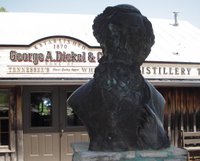
Dickel or bust!

George Dickel sits outside a bend of the Duck River on Cascade Creek, which is both a tributary to the Duck and the water source for the distillery.
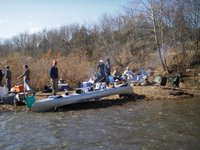
That means some of the water flowing by our kitchen on the island in November, 2005 almost became George Dickel whisky. And the George Dickel whisky we brought to the island got pissed out and sent on downstream right where it was headed all along. It just took a different path to get there.
Here is how they make it.
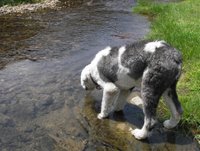
First, the waters of Cascade Creek are strained through the beard of an Old English Sheepdog.
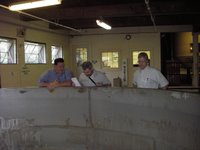
Actually they run it through a bunch of Dr. Seuss vats and pipes.

Put it in some barrels.
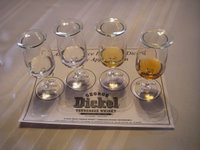
And 10 years later...presto.
But a funny thing happened when we were leaving. Our tour guide was Dickel's yankee marketing exec from New York City, engineered for patio living. He spent most of his time kissing Jim’s ink-stained butt hoping for a good article. At the end, he conspicuosly instructed the Master Distiller to give the new, high-falutin’ George Dickel "Barrel Select" to Jim only, passing over the friend standing next to him in the office. He obviously was not aware of the influence the RRCC has on matters of style and taste and didn't think it was worth sharing any more than necessary. We're not worried because Jim always shares, but there's a cautionary tale about this in The Book that is right on point:
"I know a cedar-hill man who served as foreman on one of the new cleared ranches built by city men in that region. He was a good foreman and liked his job and liked his boss. An oilman who visited the ranch offered him twice his salary to come to Oklahoma and run a ranch that he had there. He turned it down. But finally, when the offer got to three times his salary and his wife was shoving him to think of the kids and even his current employer admitted –wryly – that he wouldn’t blame him in the least for going, he agreed. He called Buck Peebles, a slient wiry type who hauls cattle and household goods and Mexican shearers and goats and any thing else that’s willing to ride on his old truck and pay for the privilege. They loaded on the furniture and the kids and the wife, and drove 200 miles up to the new place.
The oilman was waiting for them, anxious that they like him. Good men are hard to come by. He was courtly to the wife and showed them their house, a stout and handsome one, two-storied with oaks around it and a fenced yard and a deep sweet -water well and a rich garden patch. He chucked the kids under their chins and called them by their right names, all five of them. The ranch itself spread velvet-grassed to the horizons, and below the house a flowing creek wandered, dammed at one point into a ten-acre lake stocked with fish, around which registered whitefaces and fat quarter horses gazed. The kids scattered like a flushed covey, shouting. The foreman listened and looked and tasted the water and kicked the garden’s loam with his toe and dug his thumbnail into the house’s hard coat of white paint, and said practically nothing. Finally they came out front again where Buck Peebles, unheeded by anyone upon arrival or now, was leaning against his truck’s fender and smoking a patent drug-store pipe and peeling, with a sharp stockman’s knife, the bark from a green oak switch.
“Might as well start moving in,” the owner said. “I’ll get somebody up here to help you.”
“I don’t know . . .” the foreman said.
The owner glanced up. “What’s the matter?” he said. “You don’t like the house? I’ll have it changed, any way you want.”
“Ain’t that,” the foreman said.
The oilman, unsettled, said he didn’t understand. He thought it was a pretty good ranch. He knew it was.
“Ain’t that,” the other man said. “Hit’s a hell of a sweet place and that’s flat true.”
“Well, what is it then?”
“Since you ast . . .” the foreman said without hostility, jerking his head toward the wordless, whittling shape of Buck Peebles: “Since you ast, I guess what’s the matter is I don’t want to work for nobody that’s too good to speak to no God-damn truck driver.”
And with a lift of his brows he moved his family back into and onto the truck, and Buck Peebles drove them the 200 miles back down to the cedar hills and the old job."
John Graves, Goodbye to a River, p. 198.
No comments:
Post a Comment